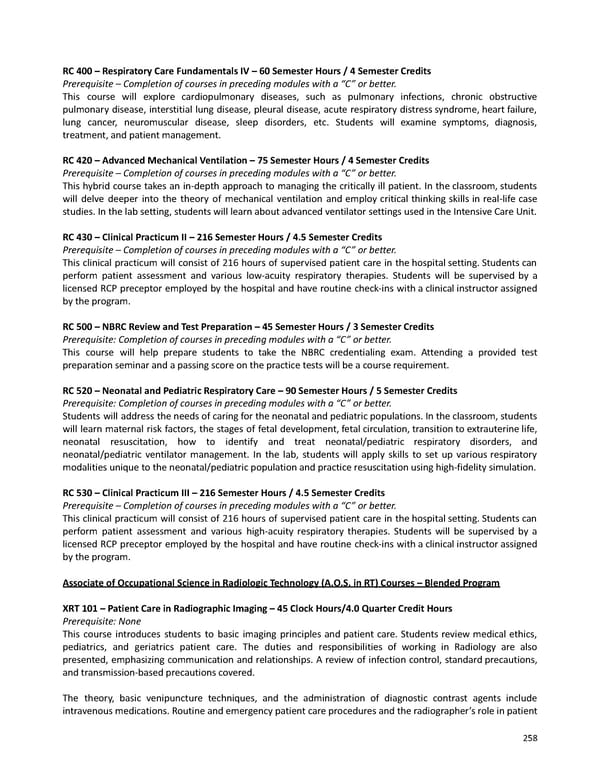RC400–RespiratoryCareFundamentalsIV–60SemesterHours/4SemesterCredits Prerequisite – Completion of courses in preceding modules with a “C” or better. This course will explore cardiopulmonary diseases, such as pulmonary infections, chronic obstructive pulmonary disease, interstitial lung disease, pleural disease, acute respiratory distress syndrome, heart failure, lung cancer, neuromuscular disease, sleep disorders, etc. Students will examine symptoms, diagnosis, treatment, and patient management. RC420–AdvancedMechanicalVentilation–75SemesterHours/4SemesterCredits Prerequisite – Completion of courses in preceding modules with a “C” or better. This hybrid course takes an in-depth approach to managing the critically ill patient. In the classroom, students will delve deeper into the theory of mechanical ventilation and employ critical thinking skills in real-life case studies. In the lab setting, students will learn about advanced ventilator settings used in the Intensive Care Unit. RC430–ClinicalPracticumII–216SemesterHours/4.5SemesterCredits Prerequisite – Completion of courses in preceding modules with a “C” or better. This clinical practicum will consist of 216 hours of supervised patient care in the hospital setting. Students can perform patient assessment and various low-acuity respiratory therapies. Students will be supervised by a licensed RCP preceptor employed by the hospital and have routine check-ins with a clinical instructor assigned bytheprogram. RC500–NBRCReviewandTestPreparation–45SemesterHours/3SemesterCredits Prerequisite: Completion of courses in preceding modules with a “C” or better. This course will help prepare students to take the NBRC credentialing exam. Attending a provided test preparation seminar and a passing score on the practice tests will be a course requirement. RC520–NeonatalandPediatricRespiratoryCare–90SemesterHours/5SemesterCredits Prerequisite: Completion of courses in preceding modules with a “C” or better. Students will address the needs of caring for the neonatal and pediatric populations. In the classroom, students will learn maternal risk factors, the stages of fetal development, fetal circulation, transition to extrauterine life, neonatal resuscitation, how to identify and treat neonatal/pediatric respiratory disorders, and neonatal/pediatric ventilator management. In the lab, students will apply skills to set up various respiratory modalities unique to the neonatal/pediatric population and practice resuscitation using high-fidelity simulation. RC530–ClinicalPracticumIII–216SemesterHours/4.5SemesterCredits Prerequisite – Completion of courses in preceding modules with a “C” or better. This clinical practicum will consist of 216 hours of supervised patient care in the hospital setting. Students can perform patient assessment and various high-acuity respiratory therapies. Students will be supervised by a licensed RCP preceptor employed by the hospital and have routine check-ins with a clinical instructor assigned bytheprogram. Associate of Occupational Science in Radiologic Technology (A.O.S. in RT) Courses – Blended Program XRT101–PatientCareinRadiographicImaging–45ClockHours/4.0QuarterCreditHours Prerequisite: None This course introduces students to basic imaging principles and patient care. Students review medical ethics, pediatrics, and geriatrics patient care. The duties and responsibilities of working in Radiology are also presented, emphasizing communication and relationships. A review of infection control, standard precautions, andtransmission-basedprecautionscovered. The theory, basic venipuncture techniques, and the administration of diagnostic contrast agents include intravenous medications. Routine and emergency patient care procedures and the radiographer’s role in patient 258
 2023-2024 | Catalog Page 257 Page 259
2023-2024 | Catalog Page 257 Page 259